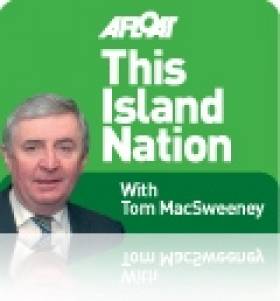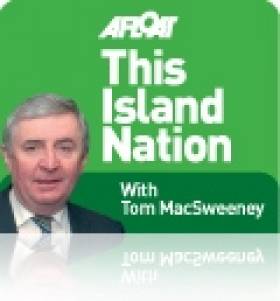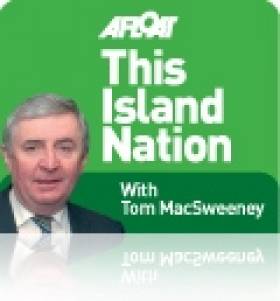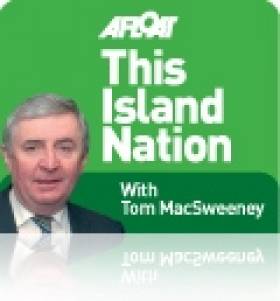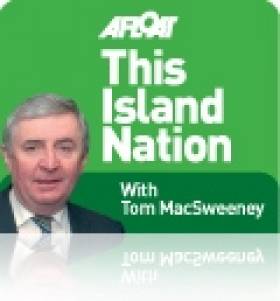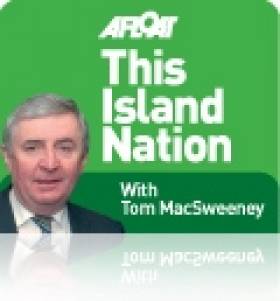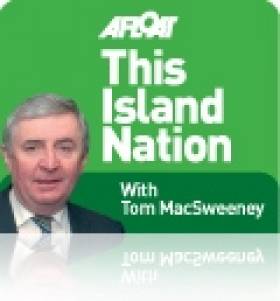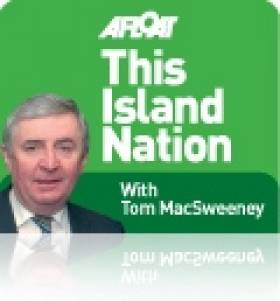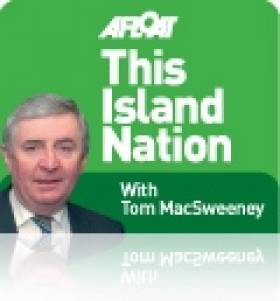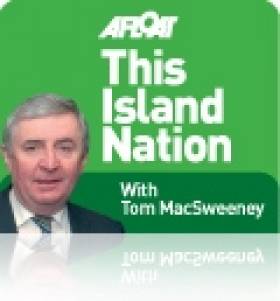Displaying items by tag: Island Nation
Searching for Trawlers, Sailing Solo, Salp & Parking Your Boat
Fishing – THE MAN WHO SEARCHED FOR 60-FOOTERS
#islandnation – Can you imagine spending years searching for old 60-foot boats, travelling the country's coastline because of a 'bug' within your system?
Pat Nolan from Cork, who now lives in County Antrim, has done that, "a labour of love, meeting with many wonderful people" who sailed these iconic vessels.
Six years ago he began tracing the histories of all eighty-eight 50-foot fishing boats built by the State fisheries board, Bord Iascaigh Mhara between 1949 and 1970, a mammoth task which he completed in two years and published in a book called 'Sea Change'. Now he has six books about fishing boats to his credit, the latest called 'A Step Up' and which, logically enough perhaps, is a record of the BIM 56-footers which were regarded as a 'step up' when introduced to Irish waters for commercial fishing.
Understandably, Pat comes from a family steeped in commercial fishing activities, into which he was born in Baltimore in West Cork. A science graduate of University College, Cork, he worked in Nigeria for a number of years before returning to Ireland and settling in Ballycastle.
He has compiled individually-traced histories of all 39 BIM-built 56-footers, a huge contribution to the archive of Ireland's maritime history. Built at several boatyards around the coast, their construction provided great employment and underwrote the shipwright tradition in Ireland which has now, unfortunately, declined to the great loss of the marine industry. Tyrrells of Arklow designed their own 56-footers for BIM.
"That all 56-footers were not identical is beyond dispute, differences existed in detail, layout and even design, but the boats were readily recognisable, regardless of variations," says Pat. "All of the boats were well-built, efficient and regarded as 'small big boats' and first-class weather boats. Yet I'd have to say there are divided opinions as to how well they met the requirements of their era, even though they were iconic boats."
Safety – ALONE ON THE WATER
My report last week that the Coast Guard had tried to get the Marine Casualty Investigation Board to make a strong recommendation against going out on the water alone drew quite a reaction from readers, varying from "nannyism" to "why can't there be mandatory licences for boating."
"What does the Coast Guard know about single-handed sailing or good seamanship for that matter? It's the same as the priests giving marriage guidance courses," Emailed Gerry Burns.
Trudy McIntyre commented: "For driving a car you need a licence and mandatory driving classes, before you go at it alone!! Why can't there be the same for pleasure boating?"
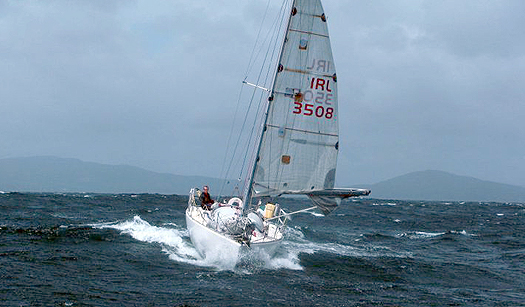
Barry Hurley sailing to solo success in Dinah
Rory described the call as: "More dictatorship and nannyism!" while Tony O'Leary wrote that "the RNLI and Coast Guard are volunteers who at the end of the day are only trying to help people when they are in trouble. In most Lifeboat and Coast Guard crews there are people who have a vast amount of experience at sea" and Jerome Lordan wrote: "Lifeboat crews and Coastguards today do not for the most part have long-time experience at sea like they had in the past when these units were manned by experienced fishermen and ex-seafarers. They seem to think you can just train up and that is sufficient. You cannot buy or train long-time experience at sea!"
Obviously a topic that raises very different opinions, amongst which are the kayakers, canoeists and solo-rowers who told me that they venture out alone as part of their sport. It should be remembered also that Irish solo sailors have achieved success in racing internationally, such as Barry Hurley from Cobh and a member of the Royal Irish YC in Dun Laoghaire with his boat Dinah.
Shipping – IRAN'S FIRST TANKER
Having shown off its first, though somewhat unusual-looking submarine to the maritime world, as I reported a few months ago, Iran has now introduced the first oil tanker it has built. Iran Shipbuilding and Offshore Industries Complex Co. (ISOICO), manufactured the ship which is 178 metres long, 32 metres wide and has a 9-metre draft according to ISOICO. Operated by the National Iranian Tanker Company, it is reported to have cost US$30m. and to be capable of carrying 35,000 tons of oil products. Its maiden voyage has been undertaken in Persian Gulf waters.
Marine Environment – SEEN A SALP?
If anyone sees a salp in Irish waters, notify the authorities at once because these gelatinous sea creatures are another example of the alien species which are not welcome visitors. Last Spring they clogged intake pipes at California's Diablo Canyon nuclear-power plant which caused it to be shut down. Now they have shown up on the Washington coast, having somehow rounded the USA. Some fishermen have found them in nets and older fishermen can remember when they were last seen 30 years ago. Marine scientists have no idea why they are arriving in big numbers. "Weird," is one description.
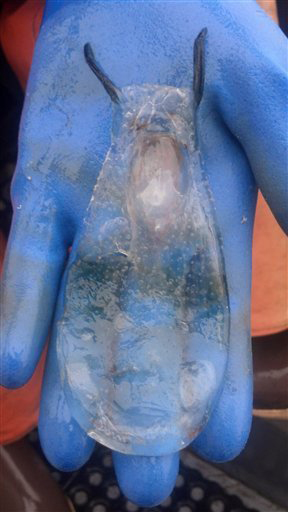
They look like a jellyfish, about the size of a human hand, with a hard head and a few tentacles. Scientists describe a salp as a pelagic tunicate which lives in the open ocean and has a tubelike body that pumps water for locomotion and to filter the plankton on which it feeds. Despite its translucent appearance, it is not closely related to jellyfish. It's a chordate, which means it has a spinal cord and is related to vertebrates. Salps can swim alone or in rope-like colonies. They have the ability to reproduce rapidly and can bloom when the plankton supply is rich. Marine scientists disagree as to whether their appearance is a sign of climate change in the sea.
Boats Wanted – DISCARDS AND SELECTIVITY
The State fisheries board, Bord Iascaigh Mhara, is going to carry out trials aimed at minimising discarding of fish and improving the use of fishing gear to avoid by-catches. Fishing vessel owners who would like to offer their vessels for use in the trials, as well as fishing gear and chandlery suppliers, are being invited to contact BIM, Crofton Road, Dun Laoghaire, Co. Dublin - Phone 01 2144100 Email:[email protected]
Oh No! – NO WAY TO PARK
Noisy parkers are a problem ashore, but if you have ever had trouble entering a marina, this video should be interesting.
Email: [email protected]
Regular news on Twitter: @Afloatmagazine @TomMacSweeney
Coastguard Warns of Putting to Sea Alone. Where is Ireland's Maritime Government?
#islandnation – On THIS ISLAND NATION this week – an island nation without a maritime government ... Coast Guard doesn't seem to like solo boaters.... Whispering to sharks ... Scrapping the only nuclear container ship and more ....
Safety
COAST GUARD SAYS NO ONE SHOULD GO TO SEA ALONE
The conclusion of the Vendee Globe, the world's toughest single-handed offshore racing around the world, highlighted the ability of sailors to overcome problems when alone, particularly the seamanship of French yachtsman Jean-Pierre Dick in Virbac Paprec 3 who sailed the last few thousand nautical miles without a keel. In most monohulled yachts that would have been the end of the boat, a capsize would have followed. But he kept his boat upright using water ballast to reach the finish line at Les Sables d'Olonne in France.
The issue of solo sailing, single-handed, alone, has been a subject of debate for many years. Arguments have ranged back-and-forth. It has been claimed that a solo sailor cannot adequately keep watch and so therefore breaks the International Regulations for Prevention of Collision, the ColRegs as they are known. On the other hand, it has been responded that single-handed sailors have kept better watch systems than crewed merchant ships where accidents have happened when vessels were left on automatic control, with no human on duty in the ship's bridge. In Ireland there has been debate in recent years about whether regulations outlaw solo sailing.
All of this came to mind in reading the report of the Marine Casualty Investigation Board into a RIB accident in Cork Harbour last June when the sole occupant was thrown into the water, the outboard engine didn't cut out and the RIB hit him causing serious injuries. In commenting on the findings the Director of the Coast Guard, Chris Reynolds, urged the MCIB "that the report should make a strong recommendation against anyone venturing to sea or on the water on their own. It is neither safe nor conducive to good seamanship."
The MCIB report focuses on the kill cord which, it says, was not functioning correctly, that the operator of the boat knew this and that he was not seated at the wheel when the accident occurred. The man concerned said his boat struck something. There is no conclusive evidence either way on this, but the MCIB said that rescuers did not note any object in the water. The MCIB is blunt, rightly so, in warning about the essential importance of the kill cord for safety in all open motorboats and that it should always be used and checked regularly. It also says that "all pleasure craft owners should complete a recognised powerboat handling course, regardless of previous experience."
The MCIB did not go as far as making the "strong recommendation" which the Coast Guard sought, but it did say that "owners and operators of recreational craft should be aware and follow the Department of Transport, Tourist and Sport's Code of Practice for the Safe Operation of Recreational Craft." If you haven't read this document, you can download it from the Department's website. The Coast Guard and Marine Safety Directorate are, of course, part of the Department. You might be surprised, for example to learn, depending on the size of your boat and where you use it, what you are required to carry aboard under safety regulations – and there is a lot more besides.
Turning back to the issue of single-handed or solo sailing, there should be a lot more discussion about this. Does a blanket-type recommendation for example refer to no single-handed dinghy sailing or kayakers or others, or going out alone to check your boat on its mooring?
CONSIDER THE MARITIME FACTS
Ireland is the third biggest country in the European Union by virtue of our claimed seabed territory of 220 million acres.
Ireland doesn't have a Department of the Marine.
Consider those two facts for a moment.
Then add – There are five different Government Departments dealing with aspects of the maritime sphere.
Now, when Ireland should be leading the case for a beneficial CFP Review the Minister for Agriculture, Food and the Marine (note that 'Marine' is last in the title) is embroiled in dealing with horsemeat in beef. There is hardly a word heard of or read about the vital importance of the CFP Review. So who is dealing with fish, the fishing industry and the Review of the Common Fisheries Policy?
I am well aware that the integrated marine plan for Ireland is named 'Harnessing Our Ocean Wealth.' But, to make this effective, five government departments must agree through an inter-departmental Marine Co-ordination Group, to transfer some of their resources to the maritime sphere. Who believes that this will actually happen?
Shipping
WORLD'S ONLY NUCLEAR CONTAINER SHIP BEING SCRAPPED
What is regarded as the world's only nuclear-powered container ship is to be scrapped because there is no use for it. The 38,226 gross tonnage Sevmorput, was built by a shipyard in the Ukraine in 1988 but has been lying idle and unused at the Atomflot base for several years. This is where nuclear-powered icebreakers are located. In the 1990s when it was used for trading, several ports refused access and others imposed such restrictions that it was difficult to operate the ship.
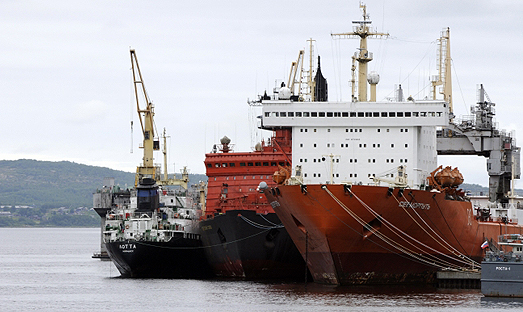
For a time it was used between Murmansk and Dudinka. Now it is considered to have no commercial future so it has been announced that it will be scrapped.
NEW CRUISE SHIPS
Carnival Corporation is to build two new cruise ships. One will be of 99,000 gross tonnage for Holland America Lines. The other will be of 135,000 gt for Carnival Cruise Lines. They will be built by the Italian Fincantieri yard, the first to be capable of carrying 2,660 passengers and due for delivery in Autumn 2015 and the Carnival ship to cater for 4,000 passengers and be delivered in Winter 2016.
Sailing
OLDEST NON-STOPPER ROUNDS CAPE HORN
On her third attempt to sail around the world solo non-stop, 70-year-old British grandmother Jeanne Socrates has rounded the Cape of Good Hope in her yacht, Nereida. She is attempting to become the oldest non-stop solo circumnavigator. She left Victoria, British Columbia, in October and successfully rounded Cape Horn in January. She is now setting a course to round Australia's Cape Leeuwin. She has already completed two previous solo-circumnavigations but during them had to put into port for repairs, after a grounding and a knock-down damaged her boat.
ABU DHABI IN VOLVO AGAIN
Ian Walker will skipper an Abu Dhabi entry again in the Volvo Ocean Race next year and there will again be a stopover in the United Arab Emirates capital. The route from Recife in Brazil to Abu Dhabi will take the teams and their brand new Volvo Ocean 65 racing yachts deep into the Southern Ocean. Abu Dhabi became the first Middle East entry in the last race.
Angling
WILL THIS WEAPON WORK AGAINST ALIENS?
Claimed to be the first of its kind in the world, Inland Fisheries Ireland, has produced what they hope will be a new weapon in the fight to stop the spread of Invasive aquatic species in Ireland - an "Individual Angler Disinfection Kit." Contained in a kit bag it comprises: 20 Virkon Aquatic (50g) tablets; a 500 ml plastic trigger spray bottle; disposable gloves; a stiff bristle brush for cleaning boots, etc.; a practical instruction manual; invasive species identification cards on a key ring; a metal 'Stop the spread of invasive species' badge and relevant invasive species literature. The kit is available from IFI and will cover disinfection for up to 20 fishing trips.
"Logistically it is impossible to provide disinfection facilities at every watercourse in the country to cater for all anglers so a different approach was require," says IFI, adding that anglers "recognise they must protect and not adversely impact the aquatic habitat or water quality."
"It will help ensure that pernicious aquatic invasive species are not spread by unsuspecting anglers as they move from one watercourse to another," says the organisation which has been fighting the growing menace of alien species arriving in Irish waters, a threat which has been rapidly increasing.
Marine Environment
THE SHARK 'WHISPERER'
The 'horse whisperer' is well-known (no burger comments!) but now there is the 'shark whisperer' filmed off Hawaii when a shark-conservationist swam up to a great white shark, patted it and even grabbed hold of its fin. By the name of 'Ocean Ramsey' she is a declared "advocate for shark preservation" and arranged for the video footage to be issued on Valentine's Day as "my expression of love for the creatures that are misunderstood and at risk of extinction!" There is some debate about the veracity of the video! "The shark acknowledged and observed me, while I peacefully and calmly allowed it to swim towards me and then accepting my touch, allowing me to dorsal and tail ride,' was her description of the experience.
Email: [email protected]
Regular news on Twitter: @afloatmagazine @TomMacSweeney
Massive Container Ships will Challenge Port Capacities
#islandnation – This week – massive container ships are on the way to challenge the port capacities .... Costa Concordia Captain speaks... Slavery for Irish seafarers... Time for environmentalists to talk to fishermen.... And much more....
THE NEW AGE OF MASSIVE CONTAINER SHIPS
Next July a container ship 400 metres long, that is 1,312 feet in length, known as a ULCV, an 'Ultra Large Container Vessel,' is due to be launched for the Maersk Shipping Line from the Daewoo Shipbuilding Yard in Seoul in South Korea. It will be 59 metres wide, 193 feet and draw a depth of 73 metres, 239 feet. The ship will be capable of carrying 18,000 containers. Maersk is the world's biggest container shipping company and intends to have 20 of these ships, Engine and hull designs will reduce CO2 emissions, it is claimed, by 50 per cent compared with the present industry average and reduce fuel consumption by utilising slow steaming methods.
These are massive vessels, called the 'Triple E' class for the three main purposes behind their creation:
• Economy of scale
• Energy efficiency
• Environmental Improvement
The 18,000 TEUs (twenty-foot containers) capacity will be 16 per cent greater than the largest vessel Maersk has at present. They set a new industry benchmark for size and fuel efficiency and will be the largest vessel of any type on the seas. The vessels are due to be delivered to Maersk this year between this year and 2015 and will change the face of container shipping dramatically. For container terminal ports they will be a huge challenge. The 'Container Supply Chain Asia Conference' in Hong Kong decided that ports worldwide would have to plan for crane and other infrastructural supports to accommodate such vessels and their container volumes and, with concerns expressed that some ports might never be able to handle them. But this is the way worldwide shipping of containers is going. As of this month there are 153 containerships on order with capacities in excess of 10,000 TEUs, including the 20 for Maersk. At present in worldwide shipping there are 121 vessels of 10,000 TEU capacity and above in service.
COSTA CONCORDIA CAPTAIN SPEAKS OUT
Captain Francesco Schetttino has spoken out for the first time since his cruise ship, the 'Costa Concordia,' sank off the coast of Italy a year ago with the loss of 32 lives. He told the UK shipping officers' union newspaper, the Nautilus Telegraph, that he hoped the tragedy would leave a legacy of improved safety. The 52-year-old Captain who is at the centre of a criminal investigation accusing him of manslaughter, causing a shipwreck and abandoning his vessel, said that he accepted his responsibilities. "But I am not a criminal. You cannot control things that are outside your control."
He has claimed that there are political reasons why a proper analysis of the accident has not been made public and said that he was confident the truth would come out and that he had not panicked after the grounding. He said he understood the reasons why the public wanted to have someone to blame, but he wanted people to have a better understanding of events on the night and of the pressures which modern Shipmasters have to work under.
The full interview is the front-page story in the February edition of the Nautilus Telegraph.
Fishing
EU GETS HUGE TRANSFER OF MONEY FROM IRELAND'S FISHING RESOURCES
I am tired of media reports that Ireland is a net beneficiary of EU funds when, at the same time, the general media makes no mention that EU nations get a huge transfer of money from catches which non-Irish EU fleets make in Irish waters. This is a transfer of funding from Ireland to the EU, without which the big fleets, such as Spanish, would not make their profits for the big Spanish companies. Let's have some media balance. That should be the basis of good journalism. Irish fishermen are subsidising benefits which other areas of Ireland get from the EU. That is the reality.
Marine Environment
GREENPEACE EUPHORIC ABOUT FISHING DECISION
The environmental organisation Greenpeace has described itself as "euphoric" about the decision by the European Parliament in supports of changes in fisheries regulations made last week. The Head of Greenpeace UK's Oceans Campaign, Willie Mackenzie, said he was euphoric about the reform measures passed by a majority of MEPs ... "the sort of reforms that us fish-heads could only have dreamed about a year ago."
However, his euphoria should be tempered by consideration of what the practicality of the European Parliament decision will mean for the fishing industry in Ireland and for fishermen, their families and fishing and coastal communities. There has, for too long, tended to be a one-sided debate on this subject with environmental lobbyists failing to take full account of what decisions actually mean. For a start, it will be the Council of Ministers which decides on fishing regulations and the sight of decaying Irish ports because of the effects of the discredited Common Fisheries Policy, is not one I like to see. Everyone does not live in urban centres and should not.
The main aims of the changes proposed - of rebuilding fish stocks to sustainable levels; setting catch limits in line with the best scientific advice; banning discards; prioritising access to those who fish in environmentally and socially beneficial ways and tightening the rules on how EU vessels fish in distant waters are targets with which there will be little, if any, disagreement from genuine fishermen whose livelihoods will only continue if there are sufficient fish in the sea. But environmental bodies have not given fair recognition or respect to Irish fishermen who have led the way in conservation in areas such as the Celtic Sea.
A ban on discards won't solve a dysfunctional Common Fisheries Policy but may help advance methods of fishing that protect species where this is needed. One of the most practical steps forward would be for environmental organisations to respect fishermen and the fishing industry and the need for fish as a food for humans. There has been enough megaphone, strident comment, now is the time for practical discussion.
Marine History
IRISH GOVERNMENT NEGLECTED SEAFARERS MADE SLAVES BY NAZI GERMANY
Successive governments and politicians of this island nation have failed the maritime community on several occasions. They failed in a shocking way when the Government and a number of politicians of the time did not help Irish seafarers who they allowed to be turned into slaves! This story is shocking and, even this far removed from the time when it happened, should be brought to national attention and those who were responsible identified. Thirty-two Irish seafarers, entitled to the protection of their government, men from a neutral nation in World War Two, were callously abandoned to their fate by the Irish government of the time which raised no complaint with the Nazi German government that subjected them to conditions of great hardship in an SS slave labour camp from 1943 to 1945.
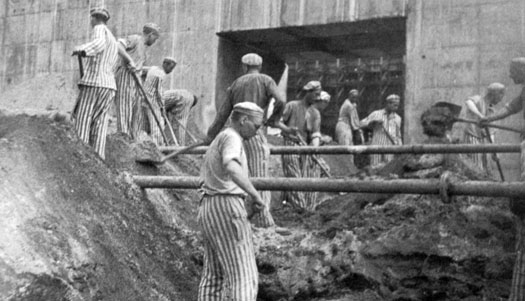
The photograph, Slave Labour in an SS camp, is reproduced courtesy of the publishers
The seamen concerned, only 27 of whom eventually returned to Ireland, are now acknowledged in Germany as a distinct group of victims of the Nazis. However, their suffering is still not recognised in Ireland, even though the principal reason they ended up as slave labour for the Nazis was because of their Irish nationality. When they returned to Ireland they were largely ignored. Their case has now been brought to light by David Blake Knox in his book – "Suddenly, While Abroad Hitler's Irish Slaves," published by New Island. The seamen were serving aboard merchant vessels. It is a book very well worth reading.
HISTORIC CORNISH FISHING BOAT SAVED
A unique piece of Cornish Maritime History is being saved. 'Dos Amigos,' believed to be St. Ive's sole surviving Carvel Gig, has a colourful history. It is thought to be the survivor of a class of St Ives boats known as 'Gigs'. They were open boats which fished under auxiliary motor and a fore and aft lugsail. 'Dos Amigos 'was built at the Paynter yard in 1920 for a local family and initially named 'Our Francis.' After 92 years as, first a well-maintained working fishing boat, then a converted gaff-ketch in Looe, she has fallen into disrepair, according to local sources, has been craned out of Looe Harbour and transported to the Treeve Boatyard in Hayle. The 38ft craft is one of renowned St. Ive's boat builder, Thomas Paynter's creations.
Dangerous Seas
How dangerous seafaring can be was underlined on Sunday when five crew of the 'Thomson Majesty' cruise ship were killed during a routine safety drill exercise after a lifeboat fell into the water from its position aboard ship whiled the vessel was in port in the Canary Islands. Three other crew were injured. About 1,400 passengers were on board at the time, but none of them were involved in the accident. An investigation is seeking to determine what caused the lifeboat to plummet into the water.
Email: [email protected]
Daily marine news on Afloat.ie
Follow on twitter @AfloatMagazine and Tom MacSweeney: @TomMacSweeney
Farmed Fish, Harbour Master Retires & Shipping Revival
#islandnation – On THIS ISLAND NATION this week – farmed fish overtake the wild kind ... Cork Harbour Master retires ...Shipping revival predicted ... EU attempt to licence leisure boating stopped ... And much more marine news .....
FARMED FISH TO OVERTAKE WILD FISH IN HUMAN CONSUMPTION
This year more farmed fish will be eaten by humans globally than they eat wild fish, according to one of the leading figures in the fish farming industry, Aquaculture Executive of the Irish Farmers' Association, Richie Flynn. If this forecast turns out to be correct it will happen at a time when two State bodies involved in the Irish fisheries sector are contradicting each other.
Bord Iascaigh Mhara, the State commercial fisheries board; and Inland Fisheries Ireland, which has responsibility for angling development, rivers and estuaries; are at loggerheads over BIM's intention to develop salmon farming in pens in Galway Bay. Fish farming, aquaculture, particularly salmon farming has been opposed by angling interests for many years and is detested by salmon anglers. Scientific and environmental arguments have been used by both sides to justify their positions, with accusations by the angling side that lice problems are caused to wild fish stocks by the farming. Claims have been made that a massive disaster will face the Irish tourist industry because of the Galway development. This is rejected by BIM, promoting the development of aquaculture to counterbalance the drop in stocks of wild fish because of stock issues, quotas and other regulatory restrictions on the fishing industry and the economic value which, they say, fish farming could bring to coastal areas.
As always when 'positions' are taken, the 'middle ground' is ignored and agreement that would require compromise, is difficult to achieve.
There are realities to be faced on both sides -
• Fish farming is not going to go away and its development will be necessary for the food industry and production is likely to overtake the provision of wild-caught fish for human consumption.
• Angling is an important tourist and economic resource but salmon angling has over many years been the preserve of those who owned rivers, wealthy interests and individuals, or controlled by angling clubs and memberships, strictly licenced, with catches restricted for stock protection.
Anglers are a powerful lobbying group which brought an end to drift-net fishing and has tried to do the same for the more limited aspect of traditional draft-netting. Preserving wild salmon stocks is essential. However, so is the future of the aquaculture industry, the provision of food stocks for human consumption and employment in the fishing industry as an economic necessity in coastal areas as well as the tourist industry. This is reality.
Shipping – CORK HARBOUR MASTER RETIRES
After 33 years' service Captain Pat Farnan has retired as Cork Port's Harbour Master and Deputy Chief Executive.
He joined the port company in 1980 as Assistant Harbour Master and was President of the European Harbour Masters Association from 1996 to 1998.Prior to 'coming ashore,' Captain Farnan served with Irish Shipping Ltd., which he joined as a Cadet, then serving in all ranks on a wide variety of vessels trading worldwide. He left Irish Shipping having been Ship's Master for two years. In his Cork post he had also been Harbour Master of Bantry Bay since 2002.
"Amongst the highlights during my time at the Port of Cork was the return of cruise liners to Cork with the berthing of the QE2 at Ringaskiddy in 1990 and the development of t cruise liner facilities in Cobh," he said. The Tall Ships Race visit in 1991, the first time the event was ever hosted in Ireland, was also a personal highlight of my career."
Deputy Harbour Master, Captain Paul O'Regan, will take up responsibility as Acting Harbour Master and Captain Pat Murphy will be the Acting Deputy Harbour Master for the immediate future.
REVIVAL PREDICTED
The shipping industry will recover from what has been described as the present "glut" which has caused sharp falls in operating profits and the laying-up of vessels.
That is according to shipping magnate and billionaire John Fredriksen who controls an international fleet of oil, bulk and gas carriers through publicly-listed companies such as Frontline Ltd. (FRO), Golden Ocean Group Ltd. (GOGL) and Golar LNG Ltd. (GLNG). Speaking in Norway he said the market for oil and fuel tankers will be the first to recover, reviving over the next 15 to 20 months, when he predicted that international trade will pick up, with oil product carriers recovering business before the biggest crude carriers, for which demand would "take more time to rebuild."
Predictions in the trade are that daily earnings for product tankers could rise 11 per cent this year, with a 4.6 per cent rise for refined fuels. Shipping predictions are that demand for use of product tankers will increase but, in contrast, there will be too much capacity available in crude tankers and dry-bulk carriers.
BUT CONTAINER INDUSTRY HAS PROBLEMS
The container shipping industry may face a wave of mergers, it has been predicted, as companies try to lower costs. Hamburg-based Hapag-Lloyd AG, the world's sixth-largest container line, is in merger talks with Hamburg Sued, the No. 12, to create the world's fourth-largest carrier. The two lines together would have capacity less than only A.P. Moeller-Maersk A/S, CMA CGM SA and Mediterranean Shipping Co. While Hamburg Sued focuses on North-South trade, Hapag-Lloyd mainly operates on East-West lanes such as Asia to Europe. Carriers have struggled to make profits in the past two years because of an overcapacity of vessels, slumping demand and low freight rates.
Marine Leisure – EUROPEAN CONTROLS OF LEISURE BOATING STOPPED
I wrote in early January about the plans by Transport Minister Leo Varadkar to introduce a 'Vessels' Registration Bill' and expressed the view that caution should be the watchword when politicians want to impose regulations that control previously individual freedoms. At the same time I said there were reasons to introduce a register of boats in Irish waters, to aid safety and counteract criminal activities, such as drug-running for which our coastline has been used.
A Dutch Member of the European Parliament has been attempting to introduce a compulsory boat licence across the European Union to be enforced under the Recreational Craft Licence. This would require regular examinations of boat users for competency and appointment of inspectors to check boats for equipment, systems, etc., requiring owners to pay a State fee for their licences. The Dutch proposal would also have introduced a total ban on the use of red diesel in boats. The UK's Royal Yachting Association has fought a strong battle against the proposal and it seems that this has been successful.
VOLVO WILL END IN GOTHENBURG
The Swedish city of Gothenburg will be the final stop on the route for the 12th edition of the Volvo Ocean Race in 2014-15 and will also feature in the 13th edition under a two-race agreement between the city and the race organisers. Gothenburg is Sweden's second largest city and Scandinavia's largest port. 2014-15 will be the third time Gothenburg has hosted the Volvo Ocean Race and the second time it has staged the finale, following the success of 2005-06 when the Swedish yacht, ABN AMRO ONE, sailed into the port as overall race winner, with Ireland's Justin Slattery as Bowman. Gothenburg, on the west coast of Sweden, is the fifth host port to be revealed so far for the 2014-15 Volvo. The race will start from Alicante in Spain and call first at Recife in north/east Brazil. It will also visit Auckland in New Zealand before rounding Cape Horn for a second Brazilian stop in Itajaí. Further port announcements will be made over the coming weeks. Ireland will not be involved after twice hosting the race in Galway.
THE HOLY 'SEE'
The new Archbishop of Canterbury in the UK, 56-year-old Justin Welby, is a sailor. Suggestions have been made that he should call his boat, 'The Holy See'!
Marine Environment – FIRST UNDERWATER ROUND THE WORLD GLIDER
The first attempt is being made to send an unmanned robotic vessel around the world underwater to collect data about marine environments, such as water currents, temperature and conditions that reveal the effects of storms on fisheries and water quality. It is on its way from South Africa to Brazil at present, controlled by scientists from Rutgers University, a Mid-Atlantic partner of the United States Integrated Ocean Observing System. The journey of what has been named the 'Challenger Glider' could take up to a year. The name recalls 'HMS Challenger,' which in the 1870s was the first vessel to circumnavigate the globe on a marine research expedition. The 'glider' is regarded as a cost-effective, low-risk method of collecting marine data at various depths and could revolutionise ocean observation work.
"Information from it would provide scientists with a more complete picture of what is happening in the ocean and may help detect trends in ocean characteristic," say the scientists. "The results could enable better forecasting and information that helps to improve safety at sea and protect the environment."
EVER HEARD OF PERSEUS?
You may not have heard of it, but the European Union is funding a project called
'PERSEUS' which stands for 'Policy-oriented marine Environmental Research in the Southern European Seas. Two hundred scientists from 20 countries around the Mediterranean and Black Seas met in Barcelona last week as part of the project to share the results of joint work they carried out over the past year that summarised what they considered to be the main stress factors affecting the health of these two seas. Amongst these "stressors" they identified fisheries; maritime transport; land-based pollutants from industry and agriculture; oil, gas and mineral exploration and exploitation causing oil spills.
BEACHY HEAD DIY
Beachy Head is the highest chalk sea cliff in Britain, rising 540 feet above sea level.
It is marked by a famous red-and-white striped lighthouse beneath the cliff which is 141 feet high. In 2011 Trinity House, the UK lighthouse authority, announced that it could no longer afford to repaint the distinctive red-and-white stripes and that it would be left to return to its natural granite grey. Trinity House maintained that, because boats have high-tech navigational systems, the coloured day-marker stripes were no longer essential. However, a public campaign to keep the stripes was launched in October 2011 and has raised stg£27,000 to repaint the stripes.
Dangerous Seas – TWENTY DEAD
An indication of how dangerous life at sea can be and how little attention loss of life often gets came in the past week when a Russian fishing vessel capsized in the Sea of Japan and 20 Russian and Indonesian crew members went missing. Ten others were rescued by a passing freighter. Not a line of coverage appeared in the Irish media!
Marine Tourism
Disc-like structures above and even below the water have been proposed by a company called Deep Ocean Technology which apparently wants to build the world's first underwater hotel. Reports suggest this could be in the lavish location of Dubai. One part of the hotel would be t thirty feet under the surface and guests wouldn't need breathing apparatus. But they might need 'deep' pockets to afford the luxury!
Email: [email protected]
Regular news @afloatmagazine
Tom MacSweeney on Twitter: @TomMacSweeney
Making Sailing in Ireland Less Elitist
#islandnation – Making sailing less elitist; BIM addressing difficulties between fishermen and processors;Captain defends his sunken ship; Cork brotherly angling duo amidst lots of cod; Using one sea to help another; RNLI independence and a giant squid is filmed.
CREATING A BETTER ATTITUDE IN SAILING
I believe strongly in making sailing a sport for everyone, that every opportunity should be taken to encourage more people into sailing and that clubs should be active in this regard. But there are still people who regard sailing as an exclusive sport which is difficult to get involved in and it has to be said that some clubs, by the attitudes they display, create an unwelcome aspect of elitism and exclusivity. The Irish Sailing Association has made the availability of the sport to everyone a keynote of its development commitment, but I am still approached by people who tell me that they have found it difficult to get into the sport.
I have been telling Norbert Reilly, Commodore of the Irish Cruiser Racing Association that I welcome the Association's launching of a nationwide 'Crew Recruitment and Training Programme.' He is enthusiastic about the project:
"ICRA represents 4,300 keel boat sailors and the objective is to create a pathway to get on to a racing yacht, promote local training and provide national standards for the various positions on a racing boat. It is open to all levels of sailors from those interested in midweek social racing, right up to a position on the Irish Commodores Cup Team. The initial roll-out of the programme will take place on April 21at Howth Yacht Club in Dublin where 120 slots will be available on the ISA's J80 yachts. The programme will consist of both water and shore-based sessions led by top Irish sailors"
ICRA will be working with the ISA and yacht clubs under the slogan: 'More Sailors...More Sailing'. I hope it succeeds. For those interested in getting involved go to the website www.cruiserracing.ie to register.
I'm delighted to see that Barry Rose is remaining actively involved with ICRA and the creation of a Commodores Cup team. ICRA has invited declarations of interest from owners to participate in an Irish challenge for the cup which was won in 2010 by the team of Anthony O Leary's Antix; Dave Dwyer's Mariners Cove and Rob Davie's Roxy. The Commodores Cup won't be sailed again until next year, so there is time to prepare an Irish team. Barry Rose will be the ICRA rep looking after the Ireland Team. Email for those interested: [email protected]
VOLVO RACE PORT ANNOUNCEMENTS
There will be two stop-overs at ports in Brazil for the next Volvo Race, the 12th edition. Itajaí, in the state of Santa Catarina, has been named in addition to Recife. The remainder of the route for the 12th edition of the Volvo Ocean race will be revealed over the coming weeks. Ireland is not expected to be involved.
Fishing – BIM DEALING WITH DIFFICULTIES BETWEEN FISHERMEN AND PROCESSORS
There have been on-going difficulties between fishermen and fish processors about the difficulties fishermen have claimed in selling their fish, getting poor prices, while processors were alleged to be buying more foreign-caught fish than supporting the Irish industry. Bord Iascaigh Mhara, the State fisheries board, has become involved and has held a number of meetings involving both sides. It seems that agreement has been reached acknowledging that there has been "poor communication between fishermen and processors" and that this has led "to a lack of supply and quality in the whitefish sector."
That is according to BIM whose CEO, Jason Whooley, has said that the whitefish sector faces serious challenges and that on-going profitability is "difficult for many of the vessels and businesses involved. Processors are competing in an extremely demanding market in terms of volume, consistency of supply and the high level of standards and quality checks that must be achieved to maintain contracts in these markets. Fishermen are working under the constraints of fuel costs, quotas, difficulties, knowing what species of fish are required by the market and when and how prices are affecting the sustainability of the catching sector to reinvest in their business," says BIM. "All parties agreed that working together, as a united entity, with greater communication would lead to an improved whitefish sector. It was agreed that the main issues to resolve were a clear communication system between fisherman and processor, scheduled landings and improved quality for some vessels."
BIM is to facilitate a pilot scheme addressing these issues over a four-to-six-week period after which fishermen and processors will meet again with BIM. This appears to indicate progress.
Shipping – CAPTAIN DEFENDS HIS SUNKEN SHIP
77-year-old Captain Apostolos Mangouras, Master of the Bahamas-flagged tanker Prestige which broke up off the coast of Spain in November 2002 has told a court there that the decision of the maritime authorities in Spain to refuse his ship a place of refuge when it was in trouble was "the worst possible" decision to make. He faces a possible sentence of 12 years in jail if found guilty of causing environmental damage when the tanker broke up and spilled over 70,000 tonnes of oil causing heavy coastal pollution. He has argued that this would not have happened if the ship had been allowed into sheltered waters to deal with problems which had occurred. He said the 1976 ship had never suffered a single detention for safety problems and should have been give refuge.
The former Head of Spain's Merchant Marine Directorate has also been put on trial over the incident, accused of causing environmental damage and he has defended his decision not to allow the Prestige into sheltered waters.
The vessel was forced to remain at sea in heavy weather for six days before it broke in two when it was about 200 nautical miles off the Spanish coastline.
The case is highlighting the problems for Shipmasters when they need a port of refuge in difficulties and are refused. The shipping industry has argued that this attitude by port states increases the danger of pollution and environmental problems.
Lifeboats – RNLI WILL REMAIN INDEPENDENT
I met Martyn Smyth, Divisional Inspector and Operations Manager for the RNLI in Ireland at Helvick last week when we discussed improvements and upgrading of the service planned by the organisation. He made it clear that the RNLI will remain independent of State involvement.
Looking over the annual rescue statistics for the RNLI in Ireland they show that the majority of calls were to pleasure craft, which accounted for 482, though this number was down from 505 in 2011. There were 115 emergency calls to fishing vessels. The call-outs indicate a lot of problems on the water, with more than half caused by people on leisure craft, including mechanical failure, running out of fuel and grounding. Twenty people a week were rescued by Irish lifeboat crews last year during which they spent over 10,000 hours at sea on emergency call-outs.
ENNIS ENTHUSIAST HONOURED
One of the country's best-known lifeboat supporters and enthusiasts, a former Valentia lifeboatman himself, Dick Robinson, is to be honoured with the award of a Gold Badge by the RNLI. This is the highest award to lifeboat supporters. Dick is also an historical expert on the lifeboat service in Ireland.
Angling – CORK BROTHERLY DUO
Brothers Noel and Christy Lane from Cork are pretty adept anglers, having made several good catches and are in the news again with the landing of a 3.18 lbs. specimen whiting off Cork when they were fishing along with other anglers out of Kinsale aboard charter skipper Butch Robert's boat Sundance Kid. Christy made the catch using mackerel-baited 'Shamrock Red Devil' lures.
BIG COD IN CORK!
Anglers have been taking catches of big cod off Cork Harbour. On Joe Lynch's Wreckhunter a 14lb. fish was caught while other catches of cod up to 12 lbs. are also reported.
COMPUTERISED FISHING ROD
An enthusiastic angler and inventor in Kansas in the USA has devised a computerised angling rod. The 'POLETAP SMARTROD' has an alarm and flashing red LED lights which go off when a fish takes a fly on the end of the line. The electronics are said to be water-resistant and the system works with any reel. It has an 'accelerometer' which will immediately detect with a high-sensitivity setting when a fish takes a lure.
The inventor, Ed Hope, says the alarms can be turned off after a fish strikes – in order not to annoy other anglers! Additionally, once the user starts reeling the line in, the fish-detecting microprocessor temporarily shuts down. This keeps the rod from flashing, shrieking "and generally carrying on throughout the fish-landing."
But will it take the fun and anticipation out of angling?
Marine Environment – USING ONE SEA TO HELP ANOTHER
A report issued by the World Bank has said that the Red Sea could be used to replenish the shrinking Dead Sea. The possibility of linking the two has been suggested for over a century. It gained urgency when the shores of the Dead Sea were found to be receding at a rate of 3.3 feet every year. An underground pipeline could channel water from the Red Sea 112 miles north to replenish the Dead Sea according to the Bank but this suggestion has been criticised by environmental groups who warned of adverse effects, such as changing the Dead Sea's colour or underground fresh water springs if they were polluted with seawater from the Red Sea.
CREATING A NEW ISLAND
The Belgian Government is considering a plan to build a new island in the North Sea to store wind energy. The intention is to build it from sand 3 kilometres off the coastline from the town of Wendnine. By pumping water out of a hollow in the middle of the island, the intention would be to store power, even though scientific opinion is that there are difficulties in storing energy generated from wind power. The Belgians are taking this approach to reduce dependence on nuclear power after two of the country's nuclear stations were shut down when cracks were found in reactor casings. It could take five years, however, to go through the planning stages and build the new island.
GIANT SQUID FILMED
Video footage of a giant squid filmed in its deep ocean habitat has caused huge interest in the marine world. It was filmed from a small underwater research submarine in the North Pacific Ocean, was about 30 feet long and silver and gold in colour. Marine biologists who shot the footage, said it was missing two tentacles
and its stomach had been removed, seemingly because of a hole in its body. "Something strange must like to eat those parts," said Dan-Eric Nilsson of Lund University. He also noted that the squid seemed to have a colour-changing system, which contained pigment and reflected light, very deep inside the giant squid's body cavity.
In recent months, researchers have also learned more about giant squid eyes. The diameter of these eyes measures two to three times that of any other animal. Giant squid eyes measure 10 inches, making them about the same size as a large dinner plate. Big is optimal for sight in deep-water environments apparently. It is believed that a giant squid can grow up to 55 feet long.
Email: [email protected]
Regular marine news from www.afloat.ie
on twitter:@afloatmagazine
on Twitter: @TomMacSweeney
Pope Benedict Pledges Support for Seafarers
This week in Afloat's ISLAND NATION column by Tom MacSweeney – the Pope supports seafarers... Lightkeepers were an unusual breed of people ... Developing the Shannon Estuary ... An Arctic Convoy Medal ... and other news stories.
Shipping – SEAFARERS HAVE LITTLE TIME IN PORT
"All of us involved in the welfare of seafarers have found that seafarers today have little time in port," the General Secretary of the International Transport Workers' Federation told the Apostleship of the Sea international congress which held in the Vatican in Rome where the Pope was presented with a high-visibility jacket as worn at work by seafarers in port.
David Cockroft said that more ports should establish welfare committees and d provide free wi-fi internet services for seafarers on visiting ships. "Considering that ships' crews have such little time in port these are minimal supports which ports should provide to help them maintain contact with families," he said.
The AoS is represented in 71 countries. Pope Benedict told the conference that seafarers "face situations of injustice," amongst which he included crews abandoned along with the vessels on which they work by owners, the threat of piracy and restrictions imposed by port authorities. He pledged that the Catholic Church would support seafarers in their rights to "dignified and safe working."
LIGHTKEEPERS – EYES ON THE COASTLINE
Lightkeepers were an unusual breed of people. I travelled to the village of Rathbarry in West Cork to meet one of them.
"We lost something with automation. The little microchip cannot look out to sea. Irish Lights was not set up to save life but the eyes which Lightkeepers provided on the coastline were important," former Lightkeeper Gerald Butler told me. "It can be said that anybody providing aids to navigation or assisting the mariner carries certain responsibilities in safety to life at sea but Irish Lights was not set up to save life at sea in the strict sense that phrase implies nor to provide eyes on the coastline for that purpose, other than the operating of the lighthouses and the safety they provided as a warning to vessels. But it seems to me that the de-manning almost passed the public by. Sometimes I do wonder. If a tragedy happens and the lighthouse near it has been de-manned, nobody asks the question or says this never happened while the stations were manned. One could say that some things just become accepted."
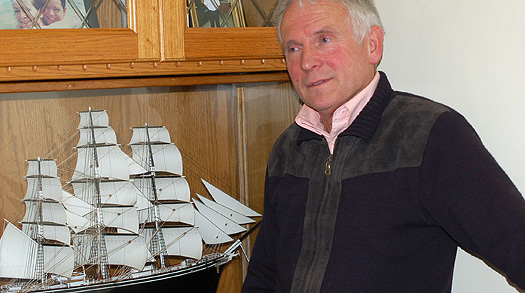
Lighthousekeeper Gerald Butler
Gerald comes from the West Cork fishing port of Castletownbere. His grandfather was the Captain of a Lightship and other predecessors were seafarers. His father was a Lightkeeper and his mother's father was a Lightkeeper. What did he miss most when he became redundant in the de-manning of the lighthouses?
"I missed time. When I was made redundant I bought a trawler and spent the next ten years fishing and I had no time of my own. There was no day under 18 hours, some were a full 24 hours. It was a tough life and I found that my creative life had to be put on hold. The comfort of a salary was gone. I am glad I did go into fishing. It opened up a new way of thinking but I lost time for myself, for other things I wanted to do, which was the one major thing I felt I lost.
"The regulations which have come into fishing have destroyed the industry. Ireland has become like a police state where fishermen have to face up to so many regulations. Fishing is a tough business. The regulations from the EU and which have been supported by the Irish Government have murdered fishing. I love the sea and I loved fishing but the regulations have destroyed the industry."
Gerald has written the story of his life. 'THE LIGHTKEEPER' has been published in paperback by The Liffey Press at €16.95. He is now Attendant at the Galley Head Lighthouse in West Cork where his father once served and where he did also. He has set up a website: www.thelightkeeper.ie
Ports – FUTURE OF THE SHANNON ESTUARY
As previously reported by Afloat.ie the public consultation period about the future development of marine-related industry along Ireland's largest estuary, the Shannon, continues until February 15.
Nine sites, described as 'strategic' have been identified for development in counties Clare, Kerry and Limerick in the 'Draft Strategic Integrated Framework Plan for the Shannon Estuary.'
Clare and Kerry County Councils, Limerick City and County Councils, Shannon Development and Shannon Foynes Port Company, were involved in drawing up the plan though they use the land-designation of 'kilometres' to describe 'navigable water' rather than the more correct description, in my view when referring to the marine sphere, of 'nautical miles.' The Shannon Estuary runs from Kerry Head and Loop Head as far as Limerick City and is described as "Ireland's premier deepwater port, catering for ships up to 200,000 deadweight, with ports at Limerick and Foynes. A number of large industries are located there, including the ESB at Moneypoint, Aughinish Alumina, Tarbert Power Station and Shannon Airport. It also has natural resources, wildlife and ecosystems and is a designated Special Area of Conservation (SAC) under the EU Habitats Directive.
Moneypoint; Innismurry/Cahercon (Clare); Limerick Docks; Foynes Island; Foynes Port and adjoining lands; Askeaton Industrial Estate; Aughinish Island, (Limerick): Tarbert Power Station and Ballylongford Landbank (Kerry) are the strategic development locations for 'Marine-Related Industry' with Askeaton zoned for 'Industry' and Limerick Docks zoned for 'Mixed Use'. Moneypoint and Tarbert Power Stations are identified as 'Key Energy Sites' in addition to Ballylongford Landbank, the site of a permitted liquefied natural gas (LNG) Project. Kilconly point, Carrig Island, Tarbert Bay (Kerry) and Moneypoint (Clare) are "opportunity sites for renewable energy developments."
Eight sites are identified for fishing and aquaculture including designated shellfish waters at Poulnasherry Bay and Carrigaholt Bay in County Clare. Other areas include Rinevella Bay, Killimer and Clonderlaw Bay in Clare, Carrig Island in Kerry and Greenish Island and Long Rock in Limerick.
The Plan includes objectives to develop the Cruise Ship industry and highlights "potential in the Islands on the Fergus Estuary"
According to Pat Keating, CEO of Shannon Foynes Port Company which is responsible for all maritime activities and port management on the Estuary, it is a "significant step forward in the positioning of the estuary as a centre of excellence for future marine and port related investment." His company is in the process of finalising a 30-year master plan for the Port of Foynes, Limerick Docks and the Shannon Estuary.
The website www.shannonestuarysifp.ie has details of the plan which is on public display and to which comments should be made by February 15. Public consultation evens are also being staged. It is intended to incorporate the plan into city and county development plans.
Fishing – NORTH-WEST PLAN
The North West Fisheries Local Action Group, supported by Bord Iascaigh Mhara, is seeking tenders to develop an integrated local development strategy for defined areas of the Sligo/Mayo coastal region for the years 2013 to 2015, in line with objectives of the European Fisheries Fund. Applications must be made by 5pm on January 25. Tender details can be downloaded from http://www.bim.ie/news-and-events/content
The development strategy will require collection of social and economic information from coastal communities and identification of infrastructural strengths and weaknesses and development opportunities of the area.
History – ARCTIC MEDAL
After a long struggle to achieve it, the Merchant Navy Association in the UK has succeeded in getting the British Government to announce the introduction of the 'Arctic Convoy Star Medal' for those who served on what were, arguably, the toughest and most difficult convoys in the harshest of conditions during World War Two. The medal is being introduced on the recommendation of a committee set up to examine the proposal, headed by Sir John Holmes.
Colman Shaughnessy of the Radio Officers' Association of which many Irish officers were members, has brought the decision to my attention and suggested that there were Irishmen on Arctic convoys who would qualify for award of the medal. Further information is awaited about the medal awards and whether it will be conferred posthumously.
Environment – CLIMATE CHANGE IS CAUSING ANTARCTIC SEA-ICE TO MOVE
Using data gathered by U.S. military satellite-tracking of the motion of the Antarctic icepack between 1992 and 2010 researchers have found a link between Antarctic winds and the growth of sea-ice in the Weddell and Ross Seas. The analysis, "Wind-driven Trends in Antarctic Sea-ice Drift," was published in the science journal 'Nature Geoscience.'
"Sea-ice is constantly on the move. Around Antarctica the ice is blown away from the Continent by strong northward winds. Since 1992 this ice drift has changed. In some areas the moving of ice away from Antarctica has doubled, while in others it has decreased significantly," said Paul Holland of the British Antarctic Survey. "Until now these changes in ice drift were only speculated upon, using computer models of Antarctic winds. This study of direct satellite observations shows the complexity of climate change. Total Antarctic sea-ice cover is increasing slowly, but individual regions are experiencing much larger gains and losses that are almost offsetting each other overall. These regional changes are caused by changes in the winds, which in turn affect the ice cover through changes in both ice drift and air temperature."
Comments on these stories. We'd love to hear from you. Please contact us or leave a comment in the box below
Email:[email protected]
Afloat on Twitter: @AfloatMagazine
Tom MacSweeney on Twitter: @TomMacSweeney
Cork Harbour Health, Sea Bass, Irish Fishermen & Rogue Waves
#islandnation – This week in THIS ISLAND NATION – health in Cork Harbour, sea bass and Irish fishermen, shipping unions take unusual action, where have the Puffins gone, rogue waves and much more...
Cork Harbour is a great local and national resource, generally regarded as the second biggest, best and most beautiful natural harbour in the world. I say that not just as a Corkman living in the harbour area, but because it is generally accepted.
There have been and remain several environmental battles on-going about the harbour involving development proposals by the semi-State Cork Port Company and for a national toxic incinerator and added to all of this Cork Harbour is the location of perhaps the biggest environmental problem Ireland has to resolve - the dumps of waste left behind by the former Irish Steel company on Haulbowline Island, alongside which the Naval Service is based.
The Government's lethargy in dealing with this problem after twelve years of reports warning about dangers to human health is disgraceful. When is work going to start on the remediation of Haulbowline Island in Cork Harbour, is a question I have been asked following public information meetings held by Cork County Council about the matter. It seems that anyone who expects to see work get underway in the near future on the proposed 'capping' of the East Waste Tip on the island, at a cost of €40m., will be disappointed. That proposal was in response to a Government request, but there are other areas of concern on the island and there is no firm indication that the State has any plans to deal with them. They are the site where the main steelworks stood and the South Tip. I have been given to understand that it could take over a year before even a waste licence is obtained to allow the Council undertake any remedial work on the East Tip.
Checking previous investigations about Haulbowline, there is a 2001 report which warned that there was a high risk to humans from PCB spills and to the marine environment from metals and high to moderate risks to humans from windblown-dust. These were just some amongst the predicted dangers highlighted by environmental consultants.
Twelve years later the Government has still not acted and by failing to do so its concern for the people who live and work in Cork Harbour in the vicinity of the former plant is open to challenge. Cork County Council has indicated its concern about the situation and awareness of contaminant issues pertaining to the site but has made clear that it does not own the site and does not have direct authority to intervene.
It is time for the Government to show more concern for the health of the people of Cork Harbour.
Fishing – FOREIGN VESSELS CAN CATCH BASS IN IRISH WATERS – BUT NOT IRISH FISHERMEN
Next June the EU Fisheries Commission is proposing to issue Total Allowable Catches for sea bass, based on the fishing track records of EU fishing nations.
Irish fishermen are unlikely to be given any quota because our Government has banned fishing for bass in Irish waters, even though British and French vessels are allowed to catch bass in Irish waters and land them into Irish ports!
This has been described as "a national self-inflicted scandal" by the Federation of Irish Fishermen which represents the country's fishing organisations. The TACs will be granted on the basis of fishing for bass in the years 2000 to 2010 and Ireland has no record as the Government banned commercial fishing for this species in the mid-90s. This was under pressure from angling interests and to protect the species. The Irish ban did not apply to foreign vessels in Irish waters.
"This is a cause of intense anger and frustration for the Irish fishing industry," said the FIF. "Other EU Member States can fish, catch and land sea bass, even into Irish ports, while Irish fishermen are prevented from catching the fish by an Irish Government decision."
The FIF has been asking for the fishery to be re-opened for several years, with a specific proposal which would have allowed a fishery over 30 miles off the South East Coast in order not to interfere with recreational angling.
"This is a self-inflicted disaster by the Government which has ignored reasonable proposals by commercial fishermen for many years and which would have gained scientific evidence about the future of the fishery," according to the FIF.
While anglers will justify the ban, it is questionable that non-Irish vessels are allowed to catch sea bass in Irish waters while Irish boats are not.
Shipping – UNIONS TAKE UNUSUAL ACTION
Shipping trade unions have taken the unusual step of announcing that they will adapt the familiar 'Fairtrade Mark' to judge the performance of shipowners. Nautilus International, the UK and Dutch trade union which includes Irish seafarers in its membership, has joined forces with the Swedish maritime union, SEKO, to introduce the 'Fair Transport' mark. This, they announced when launching the scheme in Brussels, is to see some of the key welfare principles of the fair trade movement applied to shipping. They said they took their action after asking the Fairtrade Foundation to include a clause in its licensing agreement so that any product displaying the 'Fairtrade Mark' would have to be transported on a ship meeting internationally agreed crew welfare standards.
"The Foundation wasn't interested so we are now asking stakeholders to join with us in developing our own scheme which will recognise good employers and encourage poor performers to raise their standards," the unions stated, indicating that they will launch a 'Fair Transport Mark' to be displayed by quality European shipping operators as a symbol of their commitment to the highest safety and environmental standards of shipping operation and "decent treatment of crews" as well as seeking to underpin the employment of European seafarers.
COSTA CONCORDIA DISASTER REMEMBERED
Survivors of the Costa Concordia cruise ship disaster on the Italian coast and relatives of the 32 people who died marked the first anniversary on Sunday with the unveiling of memorials to the victims, a Mass in their honour and a minute of silence at the exact moment that the cruise ship hit a reef off Tuscany. The first event of the day-long commemoration was the return to the sea of part of the massive rock that tore into the hull of the 112,000-ton ocean liner on January 13, 2012 and remained embedded as the vessel capsized, with 4,200 passengers and crew aboard. As fog horns wailed, a crane on a tug lowered the boulder onto the reef off Giglio. Affixed to it was a memorial plaque. Survivors and relatives of the dead were on a ferry watching. A land-based memorial was unveiled after a Mass and ceremony honouring rescue crews.
The Costa Concordia Captain, Francesco Schettino, remains under house arrest, accused of multiple manslaughter, causing a shipwreck and leaving the ship before all passengers were evacuated. He maintains that he saved lives by bringing the ship closer to shore rather than letting it sink in the open sea and claims that the rocks which the vessel hit were not marked on the chats
Capt. Gregorio De Falco of the Italian Coast Guard, whose blunt instruction to Captain Schettino to get back on board his ship during the disaster, was present at the ceremonies.
The ship remains capsized off the port of Giglio. Latest indications are that it will take until September to prepare the ship to be rolled upright and towed from the rocks to be dismantled.
Environment – WHERE HAVE THE PUFFINS GONE?
Research into the migratory patterns of Atlantic Puffins which reside on the island of Skellig Michael on the Kerry coastline in the Summer has shown that they travel across the entire Atlantic as far as Canada. One of the suggestions is that they follow the small oil-rich fish, capelin. Although Puffins have previously been tracked from Scotland and Wales the Irish study, using tiny tracking devices, is the first to show the birds making it across the entire Atlantic.
WHAT IS A ROGUE WAVE?
When news reports quote "rogue waves" what does that mean? What exactly is a "rogue wave?"
They are not as prevalent as media reports would indicate. A "rogue wave" can be twice as high as the highest waves normally seen in an ocean area under a given set of weather and sea conditions. "Rogue waves" have been part of maritime folklore for centuries, but their existence in reality is less proven.
The first "proof" was in 1996 when a 25 metre wave (about 75/80 feet) was recorded in the North Sea.
LOUGH HYNE FIND
There may have been a human settlement at Lough Hyne near Skibbereen and Baltimore about 4,000 years ago. That is the conclusion being reached after a small piece of flint stone discovered in the area was forwarded to the National Museum. A polished stone axe head was found there in 1954, so the latest find appears to support the habitation theory. Archaeologists have put the primary source of flint finds as in the Antrim area of Northern Ireland, making this one unusual.
Sailing – CAPE CLEAR
I have never seen as many yachts anchored in South Harbour Cape Clear, one of my most favourite spots on the West Cork coastline, as in this photograph of the harbour. It was sent to me by author and islander Chuck Kruger who was one of my leading contributors when I broadcast maritime programming on RTE Radio. Born in the USA he and his wife, Nell, bought a farm on Cape Clear Island in 1986 and he has just published yet another book, "Whiff of Whales," a collection of short stories set on the island.
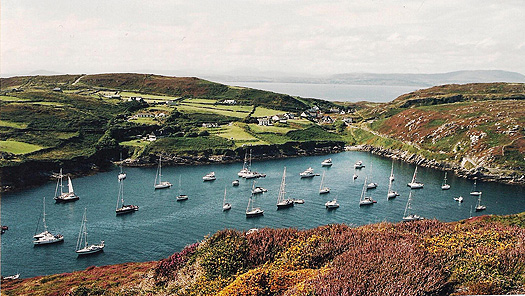
"Taken on a Summer's day from our farm," says Chuck.
Email: [email protected]
Tom MacSweeney on Twitter: @TomMacSweeney
Ireland is Plotting a Course for Compulsory Boat Registration
#islandnation– This week in THIS ISLAND NATION .... Can politicians be trusted to imposed compulsory boat registration? Preserving fishing tradition... Restricting access to the wheelhouse ... A 27-year wait ends at Glandore and much more .....
BOAT REGISTRATION
There are good reasons to have a register of boats in Irish waters. Many EU countries do. The UK and Ireland do not. The Irish Marine Federation (IMF) has called for a mandatory scheme for the identification of recreational vessels. Now Minister for Transport Leo Varadkar has indicated that a 'Vessels Registration Bill' is amongst his priorities. But there are also reasons to be cautious. Experience teaches wariness about politicians when they propose regulations affecting an area of life that has previously escaped unnecessary control.
Such legislation has been expected for some years and there have been indications of what it would contain, such as vessel identification for search-and-rescue; ensuring that boats are covered by insurance; a system to stop the avoidance of VAT on buying boats, all reasonable. However, there are additional issues to be watched.
These include whether the proposals will involve a system of taxation or licensing to swell Government financial coffers, but presented as ostensibly good for the marine sector. For example, will there be another form of 'water tax' imposed to use a boat under the guise of a licence? What restrictions will the State seek to impose on the freedom to go boating, to sail, to use a motorboat, a Rib other watercraft? Will there be compulsory "water licences" akin to "driving licences". Ridiculous to suggest? Perhaps, but there could be a reasonable argument made for such a licencing system, for safety reasons. But how would all of this affect the freedom to use the water and how would it be implemented? Would it be a 'licence' for the employment of legions of public service inspectors.
There are good reasons to require leisure craft entering Irish waters to notify the authorities, such as drug-running prevention and other breaches of the law. The only system that exists is Customs clearance which, according to some visitors, can be 'hit-and-miss,' depending upon the areas of the coastline. Let us not rush to judgement, but do let us be cautious when the State comes calling with new regulations to control the freedom to use the water.
Registration of vessels of all sizes, from small boats to container ships, is done under the Register of Shipping Act. It is not compulsory at present for leisure craft.
Maritime Tradition – DRAFT-NET FISHING
Maintaining tradition is important and in Jack Howard's home in Passage West on the edge of Cork Harbour I discussed the old craft of draft netting. Jack is Chairman of the Cork Draft Net Fishermen's Association who are allowed to fish on the River Lee from May 12 to August 14. The season has been gradually squeezed into a smaller operational period - four days a week from May to July, then 5 days in July and back again to four from Tuesday to Fridays in August. In Cork City and County, under the South/Western Fisheries Board, there are only 17 draft net licences left and the allowed fish catch is 1,632. A generation ago there would have been around a hundred licences and boats operating in the Cork Harbour area.
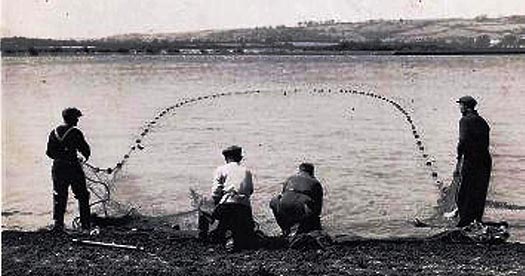
Draft net fishing on the river Lee in the 1960s - from Jack Howard's collection
"We are doing what is in our blood. It is a tradition and we want to keep it," he told me as he showed me a photograph underlining the pride of a traditional craft handed down through his family. It shows draft net fishermen working on the River Lee and is reproduced here. "There has been pressure from angling sources to abolish draft netting, but anglers should respect that we have a right to catch salmon as well as them and that it is an Irish tradition which deserves to be maintained. There is enough for everyone if everyone respects the others' interests."
I have seen draft net fishermen on the Lee and in other locations around the coast. On the Slaney, Nore, Barrow, Suir and Blackwater small flat-bottomed 'cots' are used to fish in the tidal estuaries. They have distinctive styles and as well as draft netting were used for snap-netting and drift-netting until its abolition. They were also used for eel fishing until that traditional fishery was also closed down by Government decision. In North Mayo 160 draft net men had licences. In Killary Harbour and at Leenane draft netting was often a tourist attraction during summer months.
Draft-netting is a small fishery, but in many coastal regions a way of life, carried out in estuaries and inshore bays where a boat rows out from shore, paying out a net held at the other end onshore. The boat rows against the tide so that the net forms a semicircle. When a salmon is spotted inside the enclosure or felt hitting the net, the boat closes the circle and the net is hauled in.
Shipping – REDUCE ACCESS TO THE WHEELHOUSE
The UK Marine Accident Investigation Branch has recommended that shipping companies should restrict access to the wheelhouse. In a report on a collision in the English Channel last year it says that the master of one of the ships involved had been "distracted from his primary role of watchkeeping" by the presence of other people on the ship's bridge. The collision involved the Dutch-flagged refrigerated cargoship Spring Bok and the Maltese-registered LPG tanker Gas Arctic in March about 6 nautical miles south of Dungeness. No one aboard either ship was injured but both vessels suffered structural damage.
THREAT TO SHIPYARDS
A Danish report warns that one in four of the world's shipyards could close in the next two years due to a slump in orders. There are 542 active shipyards worldwide, but 142 have no orders.
Sailing – 27-YEAR WAIT ENDS AT GLANDORE
"After 27 years, we have at last acquired a clubhouse for Glandore Harbour Yacht Club. It may have taken a long time but the reward is that we have ended up with a perfect location for our clubhouse, 100 metres from the harbour," says Commodore, Diarmuid O'Donovan. "It has been the Club's aim to have a clubhouse since its formation in 1985 and a lot of effort has been put into acquiring one which will undoubtedly add to the sailing attractions of Glandore. We have come a long way over the past few years and membership has grown significantly."
The club sailing programme caters for Cruisers, Dragons, Squibs and other dinghies and extensive training programmes include ISA training courses and a sailing programme for local schools each summer. There are club racing fixtures from May to September. The clubhouse will add to the harbour facilities when the CH Marine Classic Regatta is held there from July 20 to 26. This regatta was first run in 1992.
"We have a programme to encompass all classic boat lovers - from those who simply want to watch from the shore, to the most dedicated of boat owners," said the Commodore who has invited all interested sailors to pre-register on the club's website www.glandoreyc.com for monthly newsletter updates. Glandore has been given a €25,000 grant for remedial works, including disabled access. It has trained 10 new instructors for summer sailing courses.
Angling – SALMON SEASON
There are 55 salmon fisheries open and 59 closed for the angling season which has just begun and 32 rivers classed for "catch-and-release". For the first time since 2007 the River Liffey from Islandbridge in Dublin to Leixlip Dam in Kildare falls into this category. Recommended guidelines for catch-and-release have been published. Copies of a 20-minute video, "Catch and Release – The Future in Your Hands," is available free from Inland Fisheries Ireland, Balheary Road, Swords, Co.Dublin – phone 01 8842600.
Marine Environment – JELLYFISH STUDIES
Marine scientists will be carrying out further studies of jellyfish as a result of what have been described as "plagues of jellyfish" on the Mediterranean coastline last summer. There have been eight summers in a row of such "plagues" though previously these had occurred only once in every decade. Investigations will examine whether climate change is associated with the cause.
Fishing Industry – FENIT MEMORIAL
A memorial depicting the bronze statue of a fisherman is to be erected in Fenit, County Kerry, dedicated to local fishermen who lost their lives at sea. Seamus Connolly, a leading bronze sculptor, has been chosen to make the statute which will show a fisherman mending his net. The memorial will include an "area for reflection" incorporating memorial plaques.
Email: [email protected]
Tom MacSweeney on Twitter: @TomMacSweeney
Recession is Affecting Sailing
This week in THIS ISLAND NATION .... recession affects sailing ... when is it safe for ships to leave port ... an Irish refuge for skates... offshore exploration to increase and new protection for whales ...
RECESSION AFFECTING SAILING
As we face into a New Year I hear from sailing clubs in a number of places around the country that maintaining membership in the recession is likely to be a major challenge in the months ahead, while others involved in the marine leisure sector are also preparing plans for coping with its effects. The pattern appears to vary from one location to another, with some evidence that boatyards and marinas are also experiencing different affects, as are boat sales.
From what I am being told – and I would be interested to hear the views of readers – it seems that, where good cost deals can be found, some owners are opting to keep their boats in the water at marinas offering special occupancy rates for winter where berths, vacant because regular holders have hauled out. At the same time some yards seem to be finding that 'hauling-out' numbers are down, while others tell me regular customers are continuing to store afloat for the winter. There is also some evidence of cutbacks on spending for improvements or even maintenance where owners are opting to do it themselves when they had not done so before. As I say, the pattern is uneven around the coast, but it is not surprising that costs are determining decisions by owners.
From around the country I hear that club committees are giving particular attention to maintaining membership. Several clubs have told me that membership fees have not been changed for a few years and that this approach will be maintained. The Royal Cork Yacht Club in Crosshaven which last year introduced a monthly membership system as a response to the economic problems is taking a pro-active approach following a membership survey and a members' forum. Overall membership numbers are holding up reasonably well, but they have been examining the mix within categories and found, as is the case in other clubs, that the costs of family membership are a concern.
A number of clubs have told me that that, where previously an entire family would join and even the non-sailors would be included, it has become noticeable that only the family members who are active in sailing are joining. This reflects families watching expenditure closely, a situation likely to get more intense when the Government's swingeing Budgetary attacks on family incomes come into effect. All clubs need to hold onto current members and encourage new ones, particularly younger entrants to the sport, which has an ageing profile in several parts of the coast. The RCYC has decided to respond by reducing the costs of family and ordinary membership. Members over 65 face an increase of 50 per cent as a result, but their cost will still be less than half that of younger members. Those over 75 are not charged a membership fee.
"We have recognised concerns expressed by members and are making the adjustments," RCYC Admiral Peter Deasy has said.
The recessionary financial impacts are, without doubt, going to make 2013 a difficult one in monetary circumstances for many families and individuals. As a result, sporting activities and the costs of them may feel the impact.
Exploration – MORE ACTIVITY OFF IRELAND
Ireland has one of the most favourable financial arrangements for oil and gas exploration in the world. No matter what 'spin' the Government puts on the issue that is the reality. The Government can justify these arrangements on the basis that four decades of drilling has yielded just two major commercial finds – Kinsale Gas and the Corrib Field. Exploration is an expensive business and commercial returns need some degree of assurance. At present profits from oil and gas production in Irish waters are taxed at 25 per cent, twice the standard corporate rate, but could increase to 40 per cent for a particularly lucrative find. However, that taxation level is levied only after companies are able to write-off considerable levels of costs involved in the exploration. In the coming year it will be interesting to see how things develop as there have been undeveloped finds in Irish waters which were not considered commercial in the past, but the different energy world of today is changing how those discoveries are now viewed.
The Providence discovery of the Barryroe Field off West Cork and the prediction that it could provide at least 280 million barrels of oil has raised considerable interest. Exxon Mobil, the major oil and gas group which owns over 27 per cent of what is known as the Dunquin Prospect in the southern part of the Porcupine Basin, has indicated that it will undertake exploratory drilling about a hundred miles off the south-west coast in Block 44. Indications are that this could cost in the region of €70m. or more. That is a lot of investment money but the company's profits in 2011 were put at 41 billion dollars. The Barryroe Field is on Block 48. In the 80s there was quite a bit of exploratory drilling around the Celtic Sea off the South Coast, with a few indication of hydrocarbons being present. Market conditions prevailing then – energy prices and other cost factors – decided the companies involved that it was not worth pursuing the prospects. But times are different now, so 2013 could be an interesting year for exploration and how the Government of this cash-strapped nation will be proved right or wrong in the financial attractions it has offered to exploration companies.
Fishing – SKATES TAKE REFUGE
Marine scientists from Bangor and Queen's Universities in the North and the Marine Institute in Galway have discovered a natural refuge for the endangered species of flapper skate in the Celtic Sea. Small areas of seabed which have below-average fishing because of uneven areas that make trawling difficult are providing the refuge in the North-East of the Celtic Sea. EU regulations require fishermen to put back into the sea any flapper skate which are caught. However, the major problem is that slow growth and reproduction biological patterns amongst these fish mean that even low levels of fishing mortality are a serious danger to the future of the species.
Shipping – WHEN TO SAIL
Pressures on Ships' Captains from owners to sail even in bad weather is a contentious issue, as to whether the Master of the vessel has the overall authority of making the decision or the commercial demands of the owner dictate. Now a Russian shipowner has been charged with causing the deaths of nine crew aboard a cargoship that sank in the Sea of Okhotsk in November. The 611 dwt. vessel is alleged to have been overloaded and authorities in Russia have said that the charges follow on the owner's insistence that the ship sail despite bad weather and improper cargo procedures.
Environment – NEW PROTECTION FOR WHALES
Whales are to get more protection off the Californian coast in the USA where the United Nations' safety at sea body, the International Maritime Organisation, has approved new ship traffic rules designed to protect slow-moving endangered whales from ship collisions. These make changes on the approaches to San Francisco Bay and the ports of Los Angeles and Long Beach and in the Santa Barbara Channel.
Migrating blue, fin and humpback whales are prone to ship strikes since they are often lured to the California shoreline by plentiful krill. All three species are endangered. In 2010, five whales died in ship accidents in the area outside San Francisco Bay. Los Angeles and Long Beach ports handle more than twice as much shipping container traffic as any other USA port.
"This is a win-win situation for maritime safety and whale protection," according to the National Oceanic and Atmospheric Administration's Office of National Marine Sanctuaries in the USA.
Tom MacSweeney on Twitter: @TomMacSweeney
A Most Dangerous Cargo, No Volvo for Ireland & Lots More
This week in THIS ISLAND NATION blog .... an island people, but not insular ... the most dangerous ship's cargo in the world ... an Arctic Convoy Medal .. no Volvo for Ireland... fishing... history and much more ....
A CHRISTMAS THOUGHT
Ireland has contributed much to the maritime world. We are an island people, but not insular or inward-looking and it is particularly through our seafarers that Ireland has reached out to influence the world.
St.Brendan's legendary voyage to the New World in a leather boat was made almost a thousand years before Columbus claimed to discover America, so it is claimed in history. In the 16th century Irish shipowners traded throughout Europe and Irish fishermen developed fisheries in the North Atlantic. Irishmen were instrumental in founding the navies of the United States, Argentina and Uruguay. Irishmen served in the Chinese Imperial Navy and were involved in training the then emergent Japanese Navy in the 19th century. A descendant of an Irish family was Minister for the Marine in France in the 1840s. Irish mariners served in the British Royal Navy from the middle of the 18th century. An Irishman, Charles Davis Lucas, was the first recipient of the Victoria Cross for his courageous actions aboard HMS Hecla in the Crimean War. John Philip Holland from Clare designed the submarine. Another Irishman, Charles Parsons, invented the marine steam turbine and Admiral Francis Beaufort invented the wind force scale that is still used today. Edward Bransfield from County Cork was the first mariner in the world to see Antarctica and other Irish explorers are remembered in Polar history, including Ernest Shackleton and Tom Crean who sailed with him.
Recognition of the importance of the sea has grown in Ireland in recent years, replacing the ignorance and neglect of governments and politicians in preceding years. Appreciation of the sea has not been a general attribute of the Irish public, but this too has changed. Much damage has been done to Ireland's maritime position by the neglect of earlier years, but there is room for optimism, for hope in the future as public awareness of the sea increases.
Perhaps persistence in making the case for the importance of the sea to this island nation is an essential attribute for those of us who are committed to hearing the voice of the ocean. Just a thought for Christmas, which I hope is a happy time for you and for all seafarers, particularly those at sea away from home during the festive period, who we should particularly remember.
Shipping – THE BURDEN OF RED TAPE
Too many sectors of Irish life are burdened by red tape which is the weapon beloved by bureaucrats that often restricts innovation and development. Take note then of what the Danish Government is doing. The Danish Maritime Authority has started an online survey to identify how much of a burden red tape places on seafarers. It is open to all seafarers, of all nationalities around the world, to take part.
The international ship and crew management trade association, InterManager, is supporting the survey. Its Secretary General, Capt.Kuba Szymanski, said the project is intended to provide "a better understanding of seafarers' views on administrative work required on board ship and the burden of red tape which has to be dealt with, so that there will be a basis for new initiatives to improve the job of the seafarer."
No personal information will be disclosed about anyone who takes part in the survey. It can be accessed at: http://survey.enalyzer.com
FIRST NEW SHIP FOR DANGEROUS CARGO
Nickel ore has been described by the bulk carrier owners' association, Intercargo, as "the world's most dangerous cargo". In response to this level of concern the first ship specially-built in the world to carry this cargo has gone into service with the Japanese company, JX Shipping. The Jules Garnier II, has been constructed to meet regulations imposed by the United Nations body for safety at sea, the International Maritime Organisation in the International Maritime Solid Bulk Code.
The problem with nickel ore is that it can liquefy during transport, affecting a ship's stability and therefore safety. Such incidents have been blamed for the sinking of four vessels and the loss of 66 seafarers between 2010 and 2011.
CREW WAGE INCREASES
A survey of major shipping owners in Europe and Asia as indicated that there is an increasing shortage of ships' crews and, as a result, seafarers wages will have to be increased to acquire suitable, experienced staff aboard ship. The survey also showed that crew competence and skills are both declining, so shipowners can expect to have to meet extra costs for better crews. There is a forecast of an increase of between 2 and 3 per cent for wages next year, with shipowners also needing to improve on-board conditions.
Ports – GALWAY PLAN TO BE FINALISED
The planning application for the development of Galway Harbour is expected to be completed next year and to be submitted as a development of major national importance to Bord Pleanala. The first phase proposes to move all commercial activity from the present inner dock, inside the present harbour gates, to a new harbour to be constructed between Hare and Mutton Island. This could cost around €50m and would include major reclamation work. Raising money for the project will be a major task.
Maritime History – ARCTIC CONVOY STAR
The UK Government has announced that it will award an Arctic Convoy Star Medal as recommended by a Committee appointed to investigate the neglect of honouring seafarers who served on these convoys in horrendous and exceptionally dangerous conditions during World War Two. Colman Shaughnessy of the Radio Officers' Association has been in touch with me about this development and says there must be Irish seafarers who served on these vessels who would be entitled to such a medal. The Association, which covers the UK and Ireland, where it has membership, has been supporting a campaign for this recognition for many years by the Merchant Navy Association.
"There will be more news subsequently," says Colman. "I hope the medal can be conferred posthumously and that the families will have the honour of possessing their relatives' badge of courage."
More details about the Arctic Convoy Star Medal are to be made available by the British Ministry of Defence in the New Year.
TITANIC PLAN
Bought at an auction last year by a private individual for a sum thought to be in excess of stg£200,000 the original plan of Titanic, used at the British Inquiry to enable witnesses to indicate which part of the ship they were referring to, has gone on display at Titanic Belfast, according to the official newsletter of the Irish Titanic Society, 'White Star Journal.' The 32-foot long plan of the ship carries markings made by expert witnesses during the Inquiry showing were the ship was damaged in the iceberg collision.
Fishing – NEW FISHERIES IN DONEGAL
New fisheries are possible for inshore fishermen in Donegal over the next few months. A lesser spotted dog fishery for Inishowen fishermen using gill nets with a mesh size above 90mm, deployed within three nautical miles of shore for ten days a month is one. Also under consideration by the European Commission, according to reports, is a gill net fishery for sand dogs.
Sailing – VOLVO CHANGES
The route for the next Volvo Race 2014-15 is expected to be announced early next month, but Ireland will not feature after being involved in the last two stagings of the event through Galway where there remains some disagreement and unhappiness apparently over the outcome of costs and payments. Volvo has decided to allow one extra crew member for in-port racing and announced a series of rule changes allowing extra crew members for all-female and mixed teams and making it compulsory to have at least two under-30 crew members on each team. The next race will be the 12th running of the event which will be sailed in a one-design 65-footer.
Race CEO Knut Frostad said: "Our main objectives are to broaden the platform of entry to the Volvo Ocean Race while retaining our position as an event for the elite in the sport and to engage more and more fans going forward. The crew changes will make women's and mixed teams more competitive, while rules for on-board multimedia reporters will ensure continuance of the stunning visual contents we have come to expect from the boats. At the same time, we're making sure teams open up the race to younger sailors through our under-30s rule. The fact that we've announced this so soon after the last race shows our commitment for getting things done quickly but efficiently so everyone entering knows what to expect."
Details of the scoring system for the race will be added at a later date.
HAPPY CHRISTMAS!!
Email: [email protected]
Tom MacSweeney on Twitter: @TomMacSweeney



























